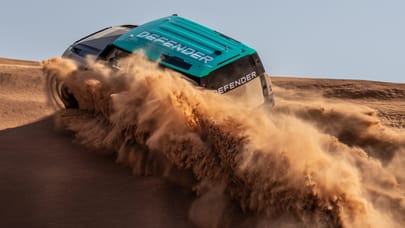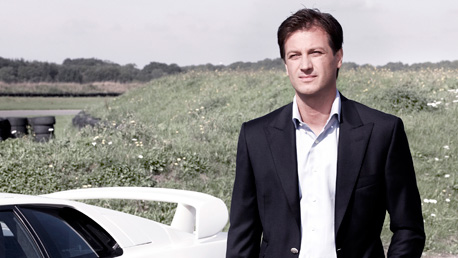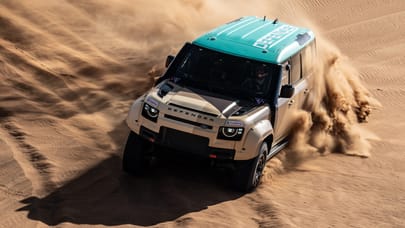
Interview: Lotus CEO Dany Bahar
Top Gear: What’s the lowdown on Lotus’ current situation? Is administration a real threat?
Dany Bahar: Lots of these rumours can be put to bed and I think that's what our new owners DRB-HICOM tried to do with the statement that they released. In it they clearly stated that they're not considering a quick sale to a Chinese buyer or moving production away from Hethel or putting Lotus into administration.
I'm in daily contact with Malaysia, in addition to this the Managing Director of DRB-HICOM, Dato’ Sri Haji Mohd Khamil Bin Jamil, Proton's new Chairman, visited Hethel on Wednesday 2nd May and reassured the management team and staff representatives that DRB-HICOM is not thinking about a sale of Lotus right now. He also made it clear that a sale still could be an opportunity, but it is not DRB-HICOM’s priority to consider this right now for Lotus. That’s what we were told and I have no reason to question it.
Dato' Sri is aware that the uncertainty is damaging the business and the brand, but he said that he needs time to completely understand the business before making a decision about Lotus and this could take a few months. This makes our life very, very difficult, but I have no choice but to accept the situation and be patient. We presented him with our journey so far since the Paris Motor Show 2010 and he was heavily impressed with what he saw, not only with the current line up, but he showed a special interest in the future cars.
TG: Are any parts of Lotus profitable at the moment?
DB: I hope you understand that we can’t go into any details, as the takeover process has heavily interfered with our plans and we are still in the process of getting our heads around where exactly we stand at the moment.
TG: Have you added value to the company during your stewardship?
DB: There are lots of improvements since we started this journey back in 2009 – let me list the most important ones:
· The management team has improved overall operational excellence and introduced greater governance.
Top Gear
Newsletter
Thank you for subscribing to our newsletter. Look out for your regular round-up of news, reviews and offers in your inbox.
Get all the latest news, reviews and exclusives, direct to your inbox.
· Since the journey began, turnover has consistently increased (£110m/FY09, £139m/FY10, £150m/FY11).
· A reduction in assembly labour hours by as much as 16%.
· We established Lotus Product Council to ensure improved governance around product development.
· We moved to multi-line approach to improve production optimisation and flow.
· The dealer network is undergoing rationalisation, with new markets developed and less effective sites closed.
· Modernisation and improvements of the Lotus site.
· Third-party engineering division restructured and strengthened.
TG: Are cars being built at Hethel as we speak? Is the factory at full production?
DB: Up until the end of March production was running at a vastly reduced rate but since 1st April we have ramped up production again and from the beginning of May we're back to normal, which means that we are producing 46 units of per week. The cars built are a mix of Evora and Elise. Production of the Exige S will start this summer.
TG: What about development of the new models? Of the five cars unveiled at Paris in 2010, we already know the Elan has been delayed.
DB: First we have to explain, that up until the takeover process began, Group Lotus was on track to meet the major milestones as set out in the five year business plan. However, from December 2011 onwards financial support from Proton and from the banks providing our loans has been strictly restricted due to takeover legislation. As you know the business plan was founded on timely financial injections, so it was clear from the outset that if the flow of money was significantly disrupted, the business would reach a critical stage very quickly. This means that at the moment all the future projects are on hold - with one exception: development of the new Esprit project has been given a green light. I can't say more than that at the moment other than to reiterate that the Chairman liked what he saw of the future range so that's a positive sign.
TG: Where do you see Lotus sales growth coming from with the new models?
DB: A couple of weeks ago I travelled to the Middle East and China where we just opened new dealerships and I could really sense an excitement about some variants of the current cars, especially the Evora S/IPS, the Evora GTE – particularly in China - and the Exige S. There's also a great deal of interest in the future cars from these markets.
TG: Does anyone thinking of buying a Lotus need to be concerned? If not, why not?
DB: No one needs to be concerned about Lotus. The values that Lotus has always stood for, performance through lightweight, creative innovation still stand strong. Every single employee is showing true fighting spirit every day in trying to keep this vision alive. This is a fact – no matter what people outside of Lotus may say. Beside this, every single car built here in Hethel represents not only the Lotus core values but also our new quality standards, this should reassure anyone thinking of buying one of our products.
TG: Have you had to trim back your motorsport program? If so, is that purely for financial reasons?
DB: If this question refers to our decision to release two teams in IndyCar, then I can assure you that we are not trimming back. It’s the opposite. Not only can we concentrate more on the remaining teams, we’ll also increase the resources and the financial support for our engine partner Judd to increase our engine performance. All the other motorsport activities continue as per the original plan. You could argue that this is a very expensive exercise, but I can tell you that most of our activities are built on a non cost basis, were both parties benefit on a brand and engineering level.
TG: Do you think that some people believe that the current product thinking (more power and more weight) undermines Lotus heritage and possibly alienates existing owners and Lotus ‘add lightness’ fans?
DB: What can I say? We have been a loss-making company for many years now. It shows that with the current product, or with an affordable product – as good as it is – it’s just not enough to sustain this operation. You have to move up the ladder to offer products that make a margin. To satisfy a buyer who is ready to spend £60-70k, you simply have to offer the right quality to justify the price - and this didn't always happen in the past. We are now starting to get the quality we want, to get the designs we want, and we now have an order bank of more than 1100 cars. The more expensive models are a major part of this – and I’m just talking about the current products. So yes, we have to focus on key elements oustide of the original core values a bit, but I still can assure every Lotus fan, that we’re trying to be lighter than our competitors and that the ride and handling will be second to none.
TG: What’s your strategy? Are you taking your ideas from other car companies?
DB: The vision for Lotus has nothing to do with any other car company. It has to do with my admiration for a British brand with strength, individuality and a history that's second to none. I believe that every car manufacturer should have its own strategy, its own unique identity, built on heritage and on the potential to grow.
Lotus is a perfect example: when we came here in 2009 we saw the perfect opportunity to revive – not reinvent – the brand. There was a realisation that affordable small cars could not make money. The decision was that we would make more expensive, more powerful, premium sportscars. This is something that even Colin Chapman saw the potential for and tried to achieve.
TG: Have things worked out the way you thought?
DB: No, not at all. The takeover of our parent company Proton by DRB-HICOM couldn’t have come at a worse time, but – again - up until that point Lotus was on track to meet the major milestones as set out in the five year business plan. The takeover process has put Lotus in a very difficult situation and it is very frustrating that the only thing we can do is to wait for a final decision how to move forward. In business sometimes things happen outside of your control and you have to do everything you can to make the best of it.
TG: Any regrets? What about the recent press release that caused such controversy?
DB: No, why should we regret anything? I’m sure there are pros and cons to everything we do, but I think this is what Lotus is about. We’re not a mainstream company. We don’t pretend to be corporate, we don’t pretend to be a big car manufacturer. We do things in a Lotus way. After all we are humans with certain emotions: we are happy, we are angry, we make mistakes and we try to learn from those mistakes – and that is summed up in the way we behave and how we communicate. Look at Lotus’ past: this company has gone through so many things: success, defeat, bankruptcies, jail, fraud, death. I think that gives you a special position. If you like us, you love us, if you don’t like us, you hate us. I don’t want to say we’re a polarising company, but Lotus is something special, something very different.
For more on Lotus, including an interview with Chief Technical Officer Wolf Zimmermann and an exclusive drive in the Lotus Evora GTE (seen in action below), you need this month’s Top Gear magazine – out now.
Trending this week
- Car Review
BMW 1 Series








